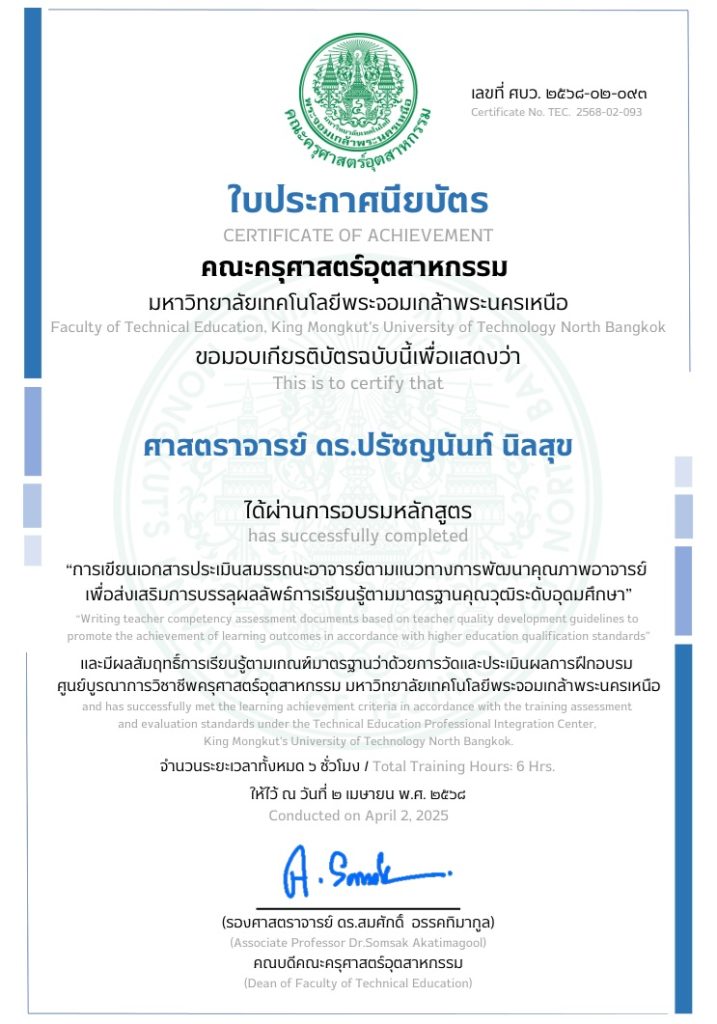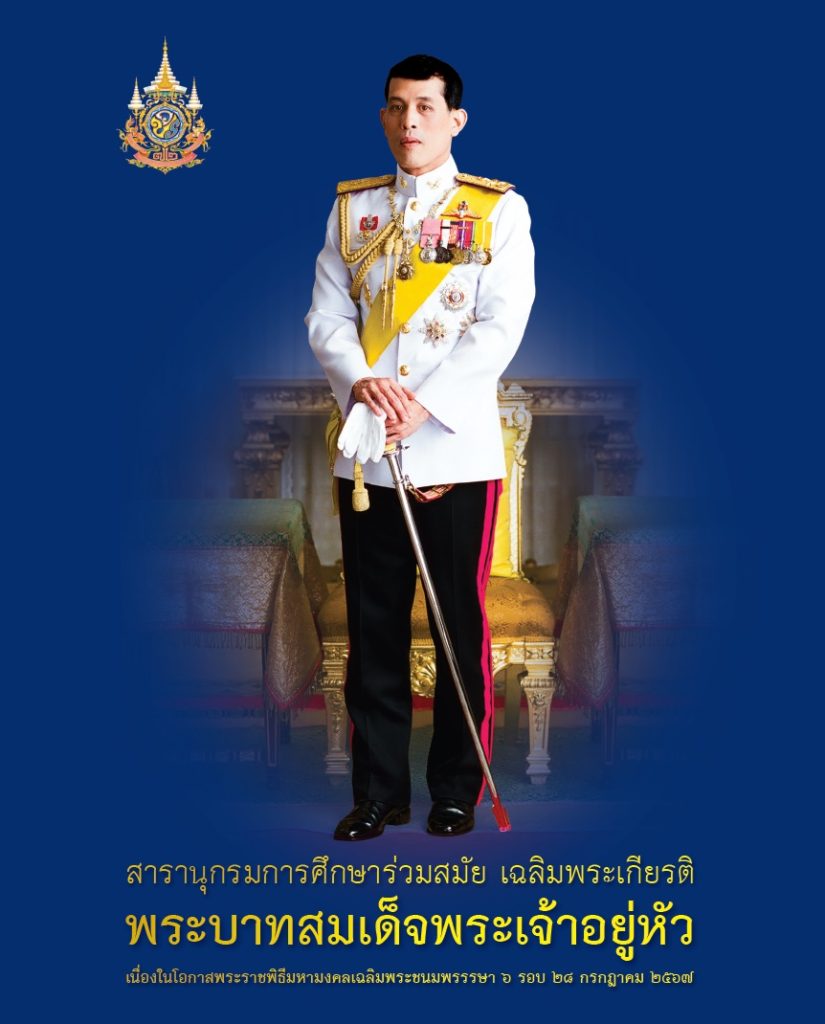
เกียรติบัตรสมรรถนะอาจารย์ มจพ.


The COVID-19 pandemic forced school closures globally, leading to significant learning regression in academic performance, skills, and ethical development. This study aims to: 1) synthesize and develop an adaptive micro-learning model based on Dhamma principles using mixed reality (MR), 2) compare pre-and post-test results, and 3) assess the model’s impact on students’ good citizenship. Participants included 19 experts and 39 Grade 6 students. The methodology involved synthesizing and developing an adaptive micro-learning model, comparing pre- and post-study scores, and evaluating academic achievement and good citizenship development. The study identified seven key steps in the adaptive micro-learning model: 1) testing prior knowledge (Dhammannuta), 2) reporting prior knowledge results (Atthanyuta), 3) explaining learning objectives (Attanyuta), 4) outlining the learning path (Mattanyuta), 5) video-based learning (Kalanyuta), 6) collaborative learning via MR (Parisanyuta), and 7) peer knowledge exchange (Pukkalanyuta). The model’s effectiveness was rated highly (x̅ = 4.78, S.D. = 0.34). Students’ good citizenship scores significantly improved, increasing from a pre-test average of 15.87 points (52.90%) to a post-test average of 25.72 points (85.73%), with statistical significance at the 0.01 level.
Kitiya Promsron, Prachyanun Nilsook & Pallop Piriyasurawong (2025)
Adaptive Micro-Learning Model Based on Dhamma Using Mixed
Reality to Develop Students to Be Good Citizens.
International Education Studies; Vol. 18, No. 2; 2025 ; pp. 123-136.
https://doi.org/10.5539/ies.v18n2p123
This research explores the development of an Intelligent Collaborative Supply Chain Management (iCSCM) system, driven by Large Language Models (LLMs), to enhance operational efficiency and facilitate collaboration among academic, governmental, and private sectors in advancing University Holding Companies (UHCs). Despite significant progress in AI-driven supply chain management, challenges remain in effectively aligning academic research with industry demands, resulting in suboptimal resource utilization and missed opportunities for commercialization. This study seeks to address these issues by proposing an AI-driven framework to optimize collaboration within this ecosystem. Employing system design frameworks, architectural evaluation matrices, and expert surveys, the study evaluates the proposed system’s effectiveness, demonstrating a high level of suitability (Mean = 4.73, SD = 0.30). The findings underscore the transformative potential of large language models in enhancing collaborative supply chain processes, equipping universities to serve as key innovation hubs that bridge the gap between research and industry applications. © Little Lion Scientific.
Artificial Intelligence; Intelligent Collaborative Supply Chain Management; Large Language Models; University Holding Company
Siriluk Phuengrod, Panita Wannapiroon and Prachyanun Nilsook (2025)
The Intelligent Collaborative Supply Chain Management with Large Language Models. Journal of Theoretical and Applied Information Technology. 15th March 2025 Vol. 103. No. 5, 2025
https://www.jatit.org/volumes/Vol103No5/20Vol103No5.pdf

ปรัชญนันท์ นิลสุข และปณิตา วรรณพิรุณ, “การเรียนรู้แบบจินตวิศวกรรม”
สารานุุกรมการศึกษาร่วมสมัย เฉลิมพระเกียรติ พระบาทสมเด็จพระเจ้าอยู่หัว
เนื่องในโอกาสพระราชพิธีมหามงคลเฉลิมพระชนมพรรษา ๖ รอบ ๒๘ กรกฎาคม ๒๕๖๗ กรุงเทพมหานคร : สำนักงานเลขาธิการครุสภา, ๒๕๖๗, หน้า 257-260
http://portal.psclib.com/ksp/ebooks/28230.pdf
พัลลภ พิริยะสุรวงศ์ ปรัชญนันท์ นิลสุข และปณิตา วรรณพิรุณ, “ประสบการณ์เรียนรู้แบบดื่มด่ำ” สารานุุกรมการศึกษาร่วมสมัย เฉลิมพระเกียรติ พระบาทสมเด็จพระเจ้าอยู่หัว เนื่องในโอกาสพระราชพิธีมหามงคลเฉลิมพระชนมพรรษา ๖ รอบ ๒๘ กรกฎาคม ๒๕๖๗ กรุงเทพมหานคร : สำนักงานเลขาธิการครุสภา, ๒๕๖๗, หน้า 364-367
http://portal.psclib.com/ksp/ebooks/28230.pdf
ปณิตา วรรณพิรุณ พัลลภ พิริยะสุรวงศ์ และปรัชญนันท์ นิลสุข , “ปัญญาประดิษฐ์รังสรรค์” สารานุุกรมการศึกษาร่วมสมัย เฉลิมพระเกียรติ พระบาทสมเด็จพระเจ้าอยู่หัว เนื่องในโอกาสพระราชพิธีมหามงคลเฉลิมพระชนมพรรษา ๖ รอบ ๒๘ กรกฎาคม ๒๕๖๗ กรุงเทพมหานคร : สำนักงานเลขาธิการครุสภา, ๒๕๖๗, หน้า 374-378 http://portal.psclib.com/ksp/ebooks/28230.pdf